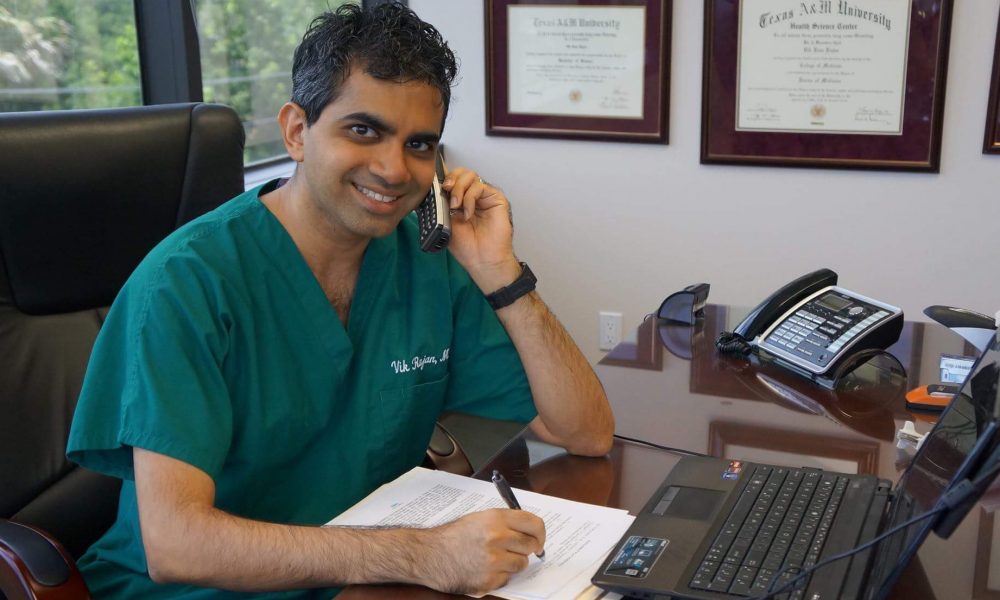

Today we’d like to introduce you to Dr. Vik R. Rajan.
Dr. Rajan, can you briefly walk us through your story – how you started and how you got to where you are today.
My interest in medicine and, ultimately, the reason I went into private patient advocacy was due to my mother’s battles with medical illness for over half of her life. When I was six, she was diagnosed with an autoimmune disease called IgA nephropathy, which required her to get a kidney transplant one year later. She required a second kidney transplant when I was 14. Eight years later, she developed end stage kidney disease again, but she could not get another transplant, so she was put on dialysis.
Being on chronic dialysis was difficult enough, but she developed so many other health problems later on that it became difficult for her physicians to handle it all. She had different doctors for different problems at different times, but each one had limited time to spend with her. Oftentimes, there wasn’t anyone who could oversee everything and “put it all together” for her. She usually had more questions than anyone had time to answer. Sometimes she was given the wrong diagnosis or treatment, and a few times she was treated less than appropriately by medical staff. She became scared and, at times, mistrustful of the medical system, and she didn’t know where to turn.
By the time all these problems started, I was in my fourth year of medical school, so with the knowledge and experience I had, I got involved as a mediator between my mother and her different health care teams. I would explain to her doctors her entire medical condition and history, explain to her what the doctors wanted to do and why, and bridge any divides between her and her health care teams. During my residency and fellowship, as I acquired more knowledge and experience with the health care system, I was able to do more to advocate for her care, including helping her doctors come up with the right diagnoses and best possible treatment plans for her various problems. For the eight years I advocated for my mother, I was able to help optimize her medical care and improve the quality and length of her life by three years more than what was expected based on her multiple health problems. For example, at one point she almost died from disseminated extra pulmonary tuberculosis, which she turned out to have had for years but was misdiagnosed until I got more involved and pushed for a lymph node biopsy to secure the diagnosis, allowing for effective treatment.
During the years I spent advocating for my mother, I noticed there was a lack of health care advocates for patients/families facing major health problems. Of the few health care advocates who are available, most are not medically trained. I also noticed during my residency and fellowship training how doctors were under increasing pressure to see more patients in less time. This is due to increased health care needs of the public with a limited supply of health care providers, combined with progressively declining insurance reimbursement rates for a doctor’s time, forcing doctors to squeeze in more patients per hour to stay financially viable. It is also the reason why you are less likely to see a doctor and more likely to see a mid-level physician’s assistant or nurse practitioner, instead.
On the other hand, procedures and tests are better reimbursed, which is why patients find themselves receiving less of a doctor’s time and more tests and procedures, instead.
The problem with all of this is that patients and their families need more than just a couple of minutes with their doctor, especially when a patient is very ill and their families are very scared and confused. Medicine is both a science and an art, and the art of medicine is the time it takes to listen to, educate, and comfort patients and their families. It is this “art of medicine” that is dying in our current health care system, and that is why patients and families feel less quality in their health care today, even though the science has improved.
By the time I finished my fellowship training in nephrology, I felt like it was time to CHANGE the health care system, not perpetuate its problems, and there was no better place to start than in my hometown of Houston, Texas, home to arguably the largest health care center in the world, yet somehow previously lacking a clinical private patient advocacy service before I started one. Therefore, instead of practicing conventional medicine, I created Houston Patient Advocacy so that patients and their families could spend as much time as they want with a medical professional to feel more educated, empowered, and comforted during times of complex illness.
Over time, I expanded my business model to include medical billing advocacy; this is another aspect of patient advocacy which helps patients deal with large medical bills, often due to insurance claim denials which need a doctor’s time to provide medical justification to the insurance company, something that doctors in full time medical practices do not always have time to do.
In 2014, I took the time to study and become certified in integrative holistic medicine through ABIHM (American Board of Integrative Holistic Medicine), which changed my perspective on the delivery of health care altogether. Clinical patient advocacy involved helping people navigate the conventional medical system, but in integrative medicine I learned that conventional medical care is not necessarily effective in the prevention and management of chronic diseases. The reason is not only the lack of time doctors have to educate their patients in the conventional medical system, but also due to an approach which centers heavily on disease-specific pharmacotherapy and medical procedures without taking the time to address the six common factors that cause most chronic diseases in the first place, which are:
– Nutrition (most important, ranging from micronutrient deficiencies to food toxicities, allergies, and intolerances)
– Exercise (usually the lack of it, along with prolonged inactivity)
– Sleep (typically insomnia or sleep apnea)
– Stress management (inability to manage stress and/or self-destructive ways of managing stress)
– Isolation (social, familial, spiritual)
– Environmental toxicities (air, water, food, home, workplace)
To the degree that any of these factors are out of balance, any chronic disease can manifest, and the real treatment involves working with the patient to correct these factors, not just figuring out what prescription drug or surgery to recommend. Using prescription drugs or surgery alone to treat a chronic disease is akin to treating symptoms without treating the actual cause, and that is assuming you do not get adverse side effects from conventional medical therapy, which happens quite a bit, sometimes to the point of causing a new disease.
In applying an integrative holistic health approach on patients who came to see me, as well as on myself and my own family, I saw significant health improvements beyond what I thought was possible based on my conventional medical training. Eventually, it got to a point where I realized integrative holistic medicine makes more sense and does better job at chronic disease prevention and management than conventional medical care alone. So, I started a concierge integrative medical practice this year, and I’ve been enjoying it ever since.
Overall, has it been relatively smooth? If not, what were some of the struggles along the way?
It was not a smooth road to get to where I got. During my medical training years, there were the struggles of trying to prolong the quality and longevity of my mother through my patient advocacy efforts. I was able to give her three years more life than what was expected of her by her doctors, but she eventually succumbed to a combination of end stage kidney and liver disease with sepsis during the last year of my medical training. My dad died in a car accident during the first year of my medical residency, six years before my mom died. Fortunately, I met my future wife a year before my mom passed away, and we all had time to spend together before my mom’s passing. (She was planning our wedding before she died.)
After deciding not to practice conventional medicine and do private patient advocacy instead, my next struggle was figuring out how to make a viable living doing patient advocacy. The challenges were that most people had never had of private patient advocacy and didn’t understand its inherent value, particularly with a doctor acting as a patient advocate. People who knew about it would often wait for extreme situations before utilizing it. Moreover, services were not covered by insurance, and private charges could get quite expensive due to the amount of time needed per case (10-20 hours typically but sometimes even more), so not everyone could afford it. Also the medical system had also not heard of private patient advocates but were generally reluctant to refer a patient to one, even if they knew.
As a result of these factors, client volume was limited, but the extra time I had ultimately allowed me to study integrative holistic medicine, which fundamentally altered the way I understood and practiced medicine and added significantly to what I could provide patients through my business. As a result, my business has finally taken off this year and is on a pathway to profitability and long-term viability over the next 12-24 months.
Houston Patient Advocacy – what should we know? What do you guys do best? What sets you apart from the competition?
While I first started doing private patient advocacy in 2010 through my company, Houston Patient Advocacy, what I practice now is integrative medicine, which involves two aspects. One is the integration of complementary alternative medicine with conventional primary care. In particular, I specialize in nutritional medicine, which involves the use of dietary modification strategies and nutraceutical supplements dosed therapeutically to decrease chronic disease and reduce prescription drug use. I combine this with lifestyle modification coaching as detailed in my health manual, The Algorithm of Six.
The other aspect of integrative medicine I do is care integration. This means if you have multiple doctors but don’t know what’s going on with your health and medical care and your doctors don’t have time to talk to you or each other, I can serve as an independent medical consultant to review your care, explain it to you, and talk to your doctors on your behalf or even go with you to medical appointments. This is also known as private patient advocacy, which is what I originally did when starting Houston Patient Advocacy.
What sets Houston Patient Advocacy apart and what I am most proud of is that I can take the time needed to properly address the areas of health that most doctors are unable to do, ranging from care coordination and billing advocacy to holistic health and nutritional medicine. I have dealt with a number of patients and their families who were in desperate situations that the conventional medical system was unable to fix, and have been able to successfully turn things around a vast majority of the time. Many of them have posted their stories online. They are a major reason why I have continued doing what I’m doing for this long.
What is “success” or “successful” for you?
The quality most important to my success is dogged persistence. If I believe in something, I will follow that path all the way to the end, regardless of the difficulties in getting to the end. I suspect this same trait is common among entrepreneurs who created start-up businesses that eventually became successful. It was certainly necessary in my case given the challenges I faced in developing a viable business starting from patient advocacy and evolving into concierge integrative holistic medicine. It is also necessary in dealing with patients having complex medical issues that need a doctor willing to see things all the way through till they make consistent improvement.
Pricing:
- Free initial 1 hour office consultation (limited time promotional offer)
Contact Info:
- Address: 6800 West Loop South – Suite 460
Bellaire, TX 77401 - Website: www.houstonpatientadvocacy.com
- Phone: 281-888-2406
- Email: dr.rajan@houstonpatientadvocacy.com






Getting in touch: VoyageHouston is built on recommendations from the community; it’s how we uncover hidden gems, so if you know someone who deserves recognition please let us know here.

















